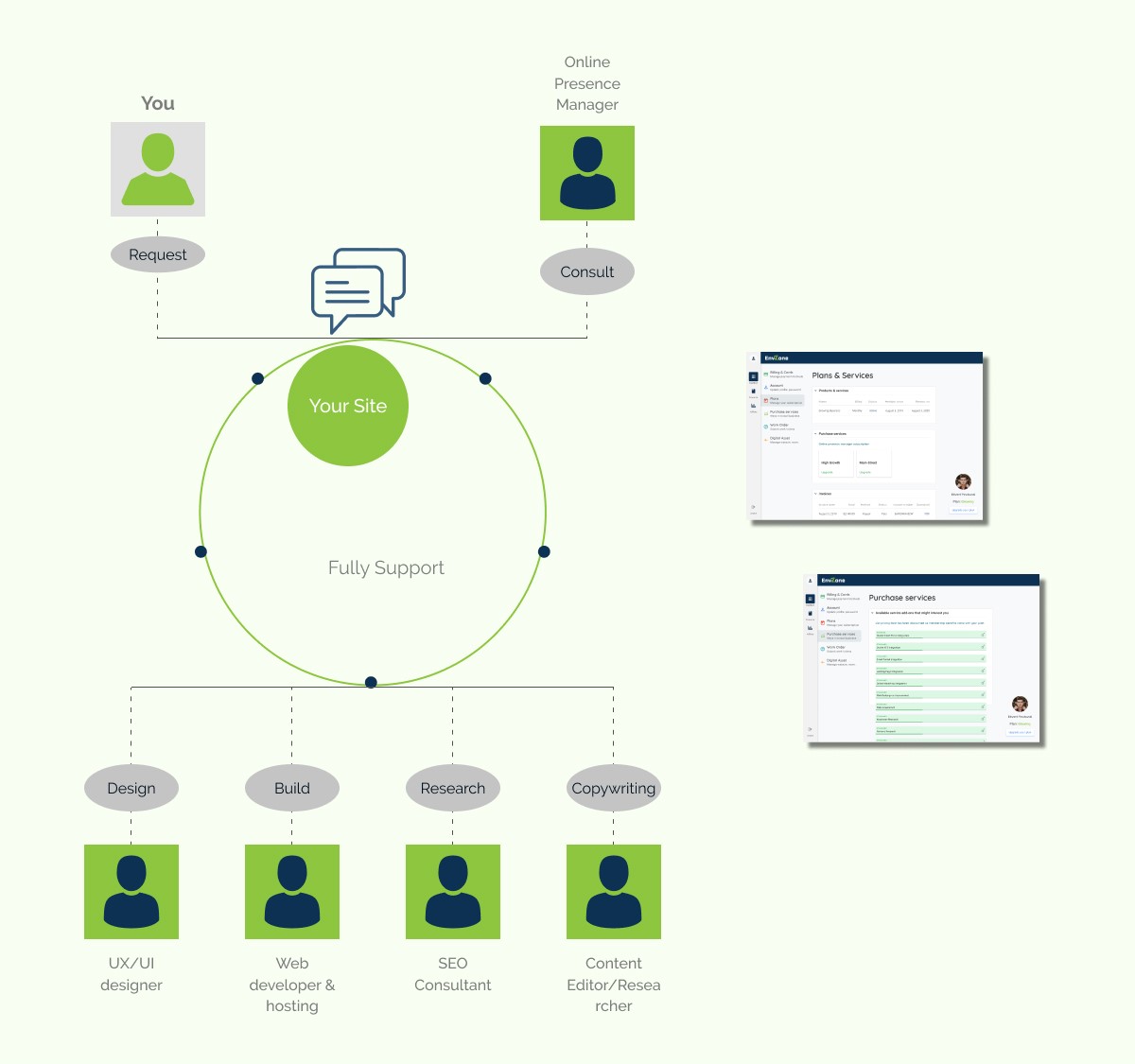Marketing Agency, Internal Team vs. MaaS Team: Key Considerations Revealed

Should you run a business, irrespective of its size and scale, it’s a “must” that your business attracts customers. Without customers, there really is not much reason for you to get up in the morning, drive to the office, turn on the lights, make payroll and carry out all the myriad of tasks as a business owner. No matter how “simple” this may seem to be, getting those customers is one of the biggest challenges that businesses face on a day in, day out basis, especially within such an ever-evolving competitive landscape.
So, how in the world could you overcome such a “sales” challenge and drive customers in the door?
The answer is just straightforward: To map out an effective, well-thought-out-and-executed marketing plan! For several companies, especially the SMBs, nonetheless, this is a business truth that is easy to be put on the back burner or settle for just throwing darts at a dartboard and hoping you hit something.
In fact, the importance of marketing in customer acquisition and revenue generation is still underestimated, particularly from the perspective of small business owners. Or, even though some does embrace strategic marketing plans, few truly understand what it actually is or how to implement one.
Unless you wish your own business to stay behind your competitors, let’s read on to uncover some hidden insights into the marketing tasks to employ for your case.
5 Biggest Misconceptions Steering SMB Owners Away from Hiring Marketers
With the aid of technological advancements, the scope of marketing has changed almost beyond recognition. Today’s marketers are “operators”, with their hands in all the different functions of the company.
However, such facts remain not well-recognized with some small business owners still deeply ingrained in some outdated myths.
Myth #1: Marketers Don’t Have Real Skills
The idea that marketing is a “fluffy” discipline might be the most obsolete misconception of all. In an era where technology is involved in every touchpoint with the customer, today’s “full-stack” marketers have to be equally comfortable writing a press release or A/B testing a new email campaign.
This is to say that modern marketers could adopt various tech platforms such as AdWords, Little Bird or HubSpot to track everything from email opens to social influencers to ad click-throughs to conversions. Not strategically evaluating marketing technologies means potentially missing opportunities to engage with a customer — or even hundreds of customers.
Nevertheless, as marketing manager Rishon Roberts shared at Fast Company, “the marketing stack is complex and traverses every surface of the marketing funnel and the customer lifecycle. The beauty of a full-stack marketer is that he or she knows how to reach and engage every single touchpoint of these funnels and cycles.” Given that, any business owner who still maintains they can handle all this alone is being overly optimistic.
Myth #2: Marketers Don’t Drive Growth
In the past, the majority of marketing campaigns pursued broad and unquantifiable goals like building brand equity or raising brand awareness. Today, marketing doesn’t just respond to business strategies, it makes such strategies.
To be more specific, a survey whose results were published in Harvard Business Review revealed that marketing’s influence on strategy development increased by 20 percentage points from 2006 to 2013 – this figure should be expected to grow further in the future. With the possible exception of information technology, we can’t think of another reason that’s more rational to explain such growth. In fact, it’s the rise of cloud computing, big data, and e-commerce that has largely made it possible to track marketing’s impact on the business’ bottom line — and that impact is MAJOR.
So, what does this mean for small- to medium-sized businesses, just like yours? It does mean that if you want to grow, it’s no longer a “should” but a “must” that you take marketing seriously as a key component of your strategy. And that means employing a marketer or marketing service sooner rather than later.

Myth #3: Marketers Just Manage Ad Campaigns
As always, appealing customers through the conception and delivery of ad campaigns is the responsibility required of today’s marketers, but this is just one amongst many other things they have to handle.
The advent of technology has given the marketers touchpoints across the entire customer lifecycle, from awareness to engagement to conversion to retention. And in fact, a truly adept marketer is able to take advantage of these without buying any ads at all.
Myth #4: Marketing Is Sheerly Tactical
Within such an ever-evolving business landscape, spearheading a marketing strategy requires more sustained attention than what an overworked SMB owner can manage, let alone cram into an already overstuffed workday.
In practice, a brand has to monitor dozens of different marketing channels at once. Remember that the voice of your business and brand should be everywhere you are, and everywhere your customer is. Hence, let’s ensure that such voice is consistent across a nearly infinite number of touchpoints, and also make strategic decisions on how that voice should sound — that’s a full-time job in itself.
Undoubtedly, running a new small- to medium-sized business is primarily a tactical position, where you’re managing the day-to-day details of operating your company. By contrast, a marketing team is inherently concerned with the long-term vision for your business. They do have the time and energy to invest in thoughtful, strategic decisions as well as watch over your brand’s image, its voice, and reputation. Doing this in our always-on, multichannel, social-media-obsessed age takes a dedicated marketer, or even a “full-stack’ team, not a distracted business owner trying to multitask.
Myth #5: You Should Never Make a Marketer Your First Hire
When launching a business, most business owners pay their first attention to a salesperson or an accountant – very rarely do they consider a jack-of-all-trades marketer or a marketing service. And this is a mistake!
Actually, defining brand identity early on, and having someone on demand specifically in charge of nurturing and growing your business’s image, is one of the best decisions a new business owner can make.
Now you’ve grasped the importance of marketers as well as marketing strategies in your business development, but do you know exactly the real tasks of a modern marketer? Or Which are specific components that make up a winning marketing strategy? Let’s go explore!
Elements of a Modern Marketing Strategy
As previously mentioned, technology has dramatically transformed the face of the marketing world. The rise of the internet, indexed search or the explosion of social media networks have changed the way that every single business communicates its value propositions.
Where once, legacy tactics such as yellow page advertisements or print ads drove foot traffic to your front door, modern customers armed with mobile technology do expect real-time access to information and make purchase decisions in a matter of a few keystrokes on their devices.
This means as a business owner, you have to be 100% sure that your branding messages are well executed, easily found on the web by sites that attract attention and convert eyeballs into real leads.
So, in order to accomplish that, what should you have to do now with your business’s marketing plan? Let’s go through the following list to figure out the key elements that make up a “modern marketing strategy”:
- Collateral development and production
- Content development specialists
- Email programs
- Market research
- Marketing software
- Metrics/data analysts
- SEO/keyword research
- Website development/re-engineering
Whereas this seems to be a very thorough list, it should be seen as incomplete as new technologies, apps and disciplines are being continuously created which makes keeping up a challenge.
You have some basic understandings over the importance of marketing as well as the elements of a modern marketing strategy, don’t you? Now, let’s shift gears and evaluate your options on how to execute your strategy – or to be more specific, which hiring decision you should take!
Marketing Strategy Execution: Hiring Internal Marketing Staff or External Marketing Resources?
As discussed above, it seems almost impossible for an SMB owner to assume the complex stack of marketing jobs. Thus, they are usually left with a choice whether to hire an in-house marketing employee or adopt external marketing resources – an on-demand online presence manager, for example.
In many instances, business owners lean towards hiring an internal employee because that has been the de-facto process in the past to solve an immediate need. Besides, they may embrace the perception that collaborating with an outside partner is far more expensive than hiring in-house staff. The problem with this rationale arises most of the time since these business owners are yet to have a true basis for comparison.
So, it’s high time that you dived into this matter instead of jumping into any rash decision.
1. Hiring Internal Marketing Staff or External Resources: Cost Considerations
Typically, most SMB owners adopt a rudimentary methodology for decision making. They, in many cases, might use a base salary versus an hourly quote for a marketing agency and thus rush to the conclusion that: Since the hourly rate is higher, it, therefore, must be the more expensive option. This turns out to be a big mix-up.
The reason behind such confusion is due to the fact that many owners fail to take into account the true costs associated with hiring and retaining an employee. In practice, besides base salary, employing an in-house staff does entail fixed expenses such as federal, state and/or local taxes as well as health insurance contributions, retirement plan matches, vacation, sick days and much more. The true cost usually totals “in the 1.25 to 1.4 times base salary range.” Should you add this with additional expenses such as the cost of recruiting and training, the figure will start to escalate quickly.
Let’s take a closer look at the cost comparison between hiring a Marketing Manager or a full-stack 6-member team vs. Marketing Agency (with services relating to Inbound Marketing). Before comparing, it’s noteworthy that all the salary data is based on the National Average salary for a Marketing Manager, and was taken from Salary.com.
Hiring an In-House Marketing Manager: Salary + Benefits
| Core Compensation – 1 Year | |
| Base Salary – National Average | $85,621 |
| Value of Benefits | |
| Social Security | $6,966 |
| 401K / 403B | $3,292 |
| Disability | $823 |
| Healthcare | $6,595 |
| Pension | $5,761 |
| Time Off | $11,255 |
| Total Compensation | $126,165 |
Hiring a Marketing Agency
| Retainer Agreement 1 Year | |
| Inbound Marketing Monthly | $3,000 |
| Software Subscriptions – Approximate based on needs | $1,000 |
| Total Annual Expenditure | $48,000 |
Annual Investment
| Hiring an Employee | $126,165 |
| Hiring a Marketing Agency | $48,000 |
| Annual Expenditure Difference | $78,165 |
Even though these figures are averages and can be adjusted based on various considerations such as your specific needs or location of the business, the table should give you a better understanding of the approximate costs of hiring each one.
Besides such pure cost factors of hiring an employee, there is one additional factor that needs to be carefully considered – the search cost. Actually, it would be exceptionally challenging to find one person that possesses each of the skills required to execute your strategy. This would most likely require your new marketing hire to outsource at least some of these tasks to outside agencies, which will really blow this comparison out of the water.
In addition to sunk costs in seeking and employing the right employee, the effective execution of many marketing tasks requires extensive software applications that call for “DINERO” or money. Such spending can take the form of upfront purchases and annual subscriptions of graphics programs, PPC management apps, business metrics software and a whole host of other requirements.
After all, having taken these factors into consideration, you will soon find out that hiring internal marketing staff is no bargain at all!
2. Hiring Internal Marketing Staff or External Resources: Internal Control
Actually, establishing internal controls allow you to place layers of checks and balances to protect your business brand. Whereas keeping marketing teams in house may not save you any money, it, in fact, gives you more control over the quality of work that’s produced and the ability to better define and preserve your company culture.
After all, to build your own team for an operational function, such as marketing, up to your wish – in terms of time, activity or expected quality – turns out to be the biggest benefit of hiring or insourcing.
So, given these major considerations, how could you – as a business owner – pick the wisest option to thrive your business?
3. The Merits of Collaborating with An Online Presence Manager: The Best of Both Worlds

The expertise from external marketing agency definitely provides the value, but the internal control of the corporate marketing from business owner’s perspective might hold you back. It is no doubt that you – as the person behind the business – do understand the most about your business as well as the customers.
A flexible solution of a dedicated online presence manager is going to address your concerns – to grant you access to the specialist expertise you need while holding full control of your marketing roadmap.
Savings on Salaries, Time & Training
For every single business, especially small businesses at their early stage, controlling expenditure can mean the difference between success and failure. Cost control and proper expense management is more than essential for ensuring liquidity, employee accountability, more accurate financial records, and better budgeting.
And fortunately, as discussed earlier, adopting an external marketing service can ease such “expense” headaches. In fact, no matter how negligible it seems to be, avoiding “hidden costs” or saving times (on onboarding, training and developing employees) does wonders for your small business. It’s also noteworthy that the pricing dynamic within a large number of marketing firms has shifted: They are now working on clearly spelled out pricing structures, and lower-fee marketing retainer agreements.
Now, let’s take a look at the below table to figure out the cost structure of this flexible MaaS plan:
Enrolling in a flexible MaaS plan for a typical $1M-revenue business
| Smart Plan Agreement 1 Year | |
| Monthly MaaS Subscription | $399 |
| 20% discount hourly rate – Monthly custom work beyond the scope, approximate based on needs. | $1,000 |
| Total Annual Expenditure | $16,788 |
Specialist Knowledge & Experience
It is impossible that one person – one particular marketing staff or manager – knows everything. This explains why hiring external resources from well-established agencies makes good business sense – in fact, if smartly choosing, you’re explicitly purchasing the services of experts.
Understandable, an agency will usually be an expert in their field – they do ‘boast” more collective knowledge than any business owner or manager, and also have access to in-house expertise on the finer details.
To take an example, in EnvZone, we do offer an Online Presence Manager as a Service. An Ongoing Presence Management Plan includes graphic designers, writers, web developers, strategist, marketing consultants and social media pros – which is often more efficient and cost-effective than hiring a full team in-house. More than that, there is an on-demand dedicated team who obtains the expertise to help you navigate even the most frustrating of shortcomings.
Not only do we have knowledge and experience in marketing, but we’ve also obtained the marketing experience in various fields ranging from e-commerce, healthcare to hospitality and travel. As a result, we can meet you half-way!

Additional Benefits…
Apart from these two, there are other attractive benefits of partnering with an on-demand online presence manager that’s well worth your attention:
- Experience in executing marketing plans
- Money savings by hiring to your specific needs
- Expertise with your market niche
- Your marketing plan is executed immediately, the employee may need time to ramp up while the marketing firm is ready from the get-go
- Avoid HR nightmares
- No additional overhead
- Tax deductions, not tax liability
- Efficiency, especially for short term and urgent projects
As a business owner, this new paradigm will allow you to focus on running your business’s core operations as well as increasing the bottom line, rather than struggling to build out a website or messing around with Google, Facebook or Twitter.
The Bottom Lines
Nobody is going to walk into your office and ask for whatever it is that you are offering unless they know who you are, what you do, why your product or service is of benefit to them, how you are differentiated from your competitors – and more than that, they have confidence that you can deliver on your promises. To get those facts effectively communicated, your business has to adopt a winning marketing strategy and practices.
Of course, an in-house marketing team can do. But, employing an on-demand online presence manager as a service may turn out to be a smart choice in terms of expected performance, cost-effectiveness and internal control.
Running a small business is already overwhelmed with several operational activities but keeping your business image visible online is also crucial to ignite the profitability of your business. Should you need any help with a dedicated team to get your business exposed to the digital world, don’t hesitate to get an Online Presence Manager.
You Might Also Like:








